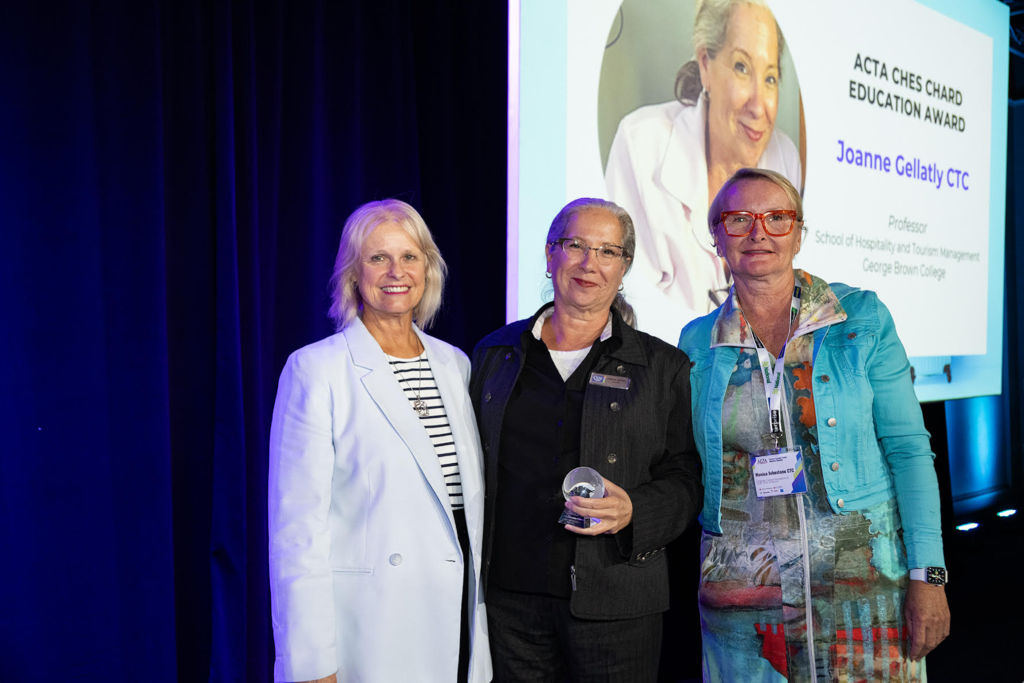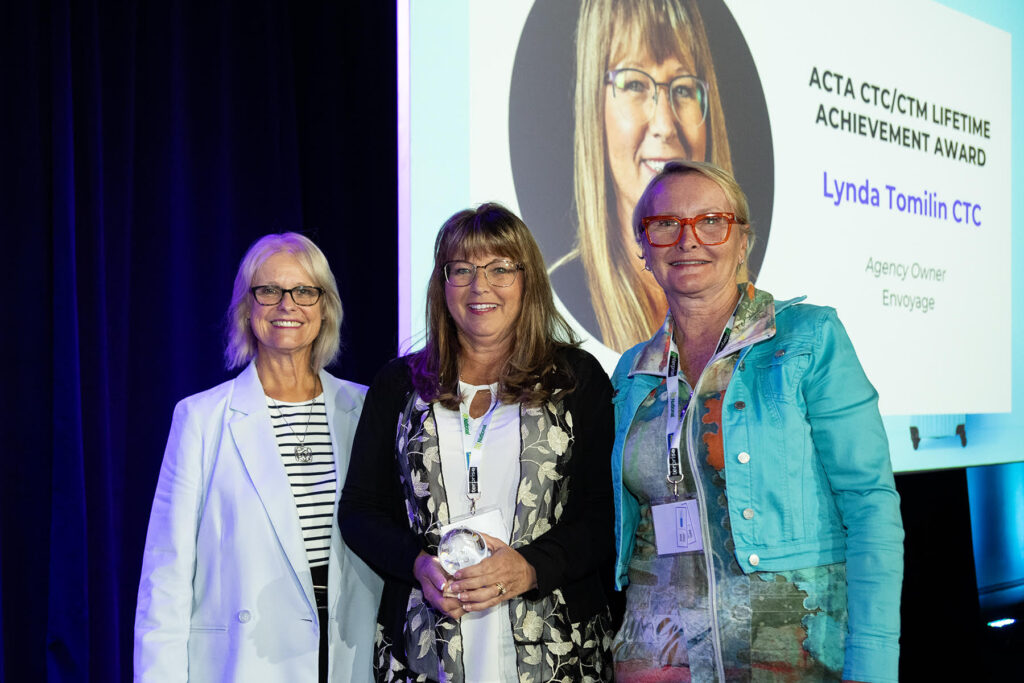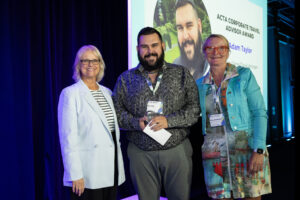TORONTO — We’ve entered the “normal-normal,” as Wendy Paradis puts it, a new post-pandemic era that’s characterized by vibrant growth and revenue for travel advisors.
Speaking yesterday at ACTA’s Eastern Canada Travel Industry Summit in Toronto, Paradis, President of ACTA, noted that the travel industry has shifted from what was often referred to as “the new normal” in the immediate aftermath of the pandemic, when overworked travel advisors were reacting to and dealing with unprecedented demand and limited capacity, to today’s “normal-normal,” a much more stable period during which advisors are once again having to be more proactive in acquiring business.
“For the most part, 2023 was an excellent year in terms of recovery, when lots of progress was made. However, travel transactions for the most part were still slightly behind 2019. But travel agencies, travel advisors and travel suppliers still did really well because of higher prices in 2023,” said Paradis.
“Overall, the future is definitely bright. The global travel and tourism outlook is robust – for demand and for revenue – and we are poised for vibrant growth over the next 10 years.”
Although consumer confidence remains a “little shaky,” experts are feeling good about the economic forecast, added Paradis, with inflation easing, employment and wages expected to remain steady and a disposable income expected to rise. All this bodes well for the travel industry, particularly as it welcomes more and more new travel advisors.
Of particular interest, said Paradis, is a significant shift among travel agencies from hiring employees to working with Independent Consultants (what ACTA refers to as sole proprietors) who work on 100% commission. And for employees who are working at travel agencies, they’re seeing significant wage increases compared to 2019 due to continued mergers and acquisitions in the travel industry.
KEY TRAVEL TRENDS
At the top of the list of new travel trends, said Paradis, is sustainable and eco-friendly travel. According to McKinsey & Company’s ‘The state of tourism and hospitality 2024’ study, 80% of travellers visit just 10% of the world’s tourist destinations, directly resulting in overtourism in places like Venice, Barcelona and Machu Picchu, and an increased demand for more responsible travel that directly impacts local economies and the environment.
Other emerging trends, added Paradis, include experiential travel (“Gone is the desire to follow the crowds, with people prioritizing experiences over things”), as well as workations and work-from-anywhere travel, particularly among Millennials, Gen Zers and Gen Xers, more and more of whom are working for months at a time in different countries.
“There has been a dramatic improvement of Internet around the world, which has enabled these groups to travel and work for months at a time in another country. And countries are being proactive to attract these travellers with special visas, so this has become a really big trend,” said Paradis.
WHO’S TRAVELLING IN 2025?
Travel forecasts indicate that Millennials (people born between 1981 and 1996) will be the most active travellers in 2025, followed by Gen Z (those born between 1997 and 2012). Why?
“Because the younger generation is prioritizing travel over things,” said Paradis. “Unlike us Baby Boomers who wanted the car, the house and the kids right away, they’re prioritizing travel instead.”
But Paradis was quick to note that Gen Xers (those between the ages of 44-59) and Baby Boomers (60-75 years old) shouldn’t be discounted as they’re the groups who are spending the money on travel.
“Even though you may be hearing how wealthy millennials are these days, Baby Boomers still hold the bulk of the wealth when it comes to travel. The younger boomers, who are around 60 years of age, have the most money, the best health and the least amount of debt, so they are absolutely a key target market for all of us,” said Paradis.
MAXIMIZING SALES
The best way to maximize sales is for travel advisors to focus on specific products and sectors that offer higher margins, said Paradis. At the top of the list is luxury travel, with 85% of luxury travellers viewing travel advisors as the best way to personalize travel. Following closely behind is cruise, which has seen a phenomenal rebound post-pandemic, particularly among Millennials. Plus, river expeditions is seeing the highest growth area in cruise, with a 70% increase since 2019.
Other sectors travel advisors should be focusing on to maximize their sales include business travel, which struggled the most in its recovery but is now seeing increased capacity; weddings and honeymoons; adventure and expedition travel; groups and families; meetings and conventions; and health and wellness travel, which has been a mainstay for Gen X and Baby Boomers.
TIPS FROM TRAVEL ADVISORS
Yesterday’s Summit also kicked off with a panel discussion, ‘Strategies for Thriving Travel Advisors,’ led by Monica Johnstone, Chair of the ACTA Board of Directors and President of Uniglobe Travel Innovations, and featuring: Judith Coates, Wired for Travel (The Travel Agent Next Door); Naomi Rogers, Caledon Travel (Trevello Travel Group); Joanne Patterson, Direct Travel; and Lynda Tomilin, Envoyage.
Here are some key tips that all four advisors shared to help maximize sales and enhance business:
- Start a group: When asked how to attract and retain clients, Coates suggests creating a group on social media platforms like Facebook. “One of my associates created a group called ‘Family Travel Tips’ two years ago – today, it has over 8,000 members, all young families who are looking for advice on where to go, where to stay and what to avoid,” said Coates. Seeing her associate’s success, Coates also created a group called ‘Canadians Travel to Italy,’ which has 1,000 members after just five months. “It’s a wealth of people looking for help planning a trip, so it’s really easy to ask questions and take the conversation offline and say, ‘How can I help you make this the best trip ever?’” said Coates.
- Ask for referrals: Rogers always asks her clients for referrals, which she then posts on her website to attract new clients. “I’ll say, ‘look at my website, read through my referrals, and see what people are saying about me.’ That way, when people come to me, they’ll already know they want to work with me.”
- Justify charging fees: ACTA has been encouraging travel advisors for years to charge professional service fees, something Patterson lives by. But she also noted that it’s equally important to justify the fees to clients. “I charge fees for each and every product. But you also have to show them the value – it isn’t just something that you charge,” said Patterson. “I have a spreadsheet that not only shows the fees, but also what value I bring to each and every booking. You have to explain what value you bring to the table.”
- Upsell, upsell, upsell: Tomilin couldn’t stress enough the importance of upselling, which she said is the most important thing for advisors to do right from the start of the booking process. “Get them a park & stay rate, insurance is another big one, explain to them that a partial ocean view room could mean standing on someone else’s shoulders on the deck,” she said with a laugh. “And class of service on airlines can easily be boosted for just $200 more. Tell them they can move up to Club Class seats or Business Class seats where they’re going to be treated extra special.”
- Get travel educated: Tomilin also encouraged travel advisors to get educated and soak up as much information as they can. This means attending in-house events in their community, complete online trainings, attend fam trips (“Not the vacation fam trips, but the actual learning ones”), get to know their BDMs, and piggyback with a more experienced travel advisor to learn directly from them.
- Start small: Addressing new-to-industry travel advisors directly, Patterson recommended starting off small and avoid trying to focus on too many things all at once. “You’ve got to really know the community that you live in, to know the type of clients you’re dealing with. So I think it’s really important to engage with rotary clubs and local business, to really hone in on what your community is about. Then you can adapt to the clients that are in that area.”

‘Strategies for Thriving Travel Advisors’ panel discussion
AWARD WINNERS
The Summit culminated with the presentation of ACTA Awards, The 2024 winners are as follows:
- Leisure Travel Advisor Award Winner: Mary De Almeida CTC (Mississauga, ON)
- Corporate Travel Advisor Award Winner: Adam Taylor (Bedford, NS)
- Tomorrow’s Leader Award Winner: Allison Long (Calgary, AB)
- Ches Chard Education Award Winner: Joanne Gellatly CTC (Toronto, ON)
- Gerald Hiefetz Advocacy Award Winner: Louise Gardiner CTC, CTM (Kitchener, ON)
- CTC/CTM Lifetime Achievement Award Winner: Lynda Tomilin CTC (Barrie, ON)
Congratulations to all the winners!
- Wendy Paradis, Louise Gardiner, Monica Johnstone
- Wendy Paradis, Joanne Gellatly, Monica Johnstone
- Wendy Paradis, Lynda Tomilin, Monica Johnstone
- Wendy Paradis, Allison Long, Monica Johnstone
- Wendy Paradis, ADam Taylor, Monica Johnstone






